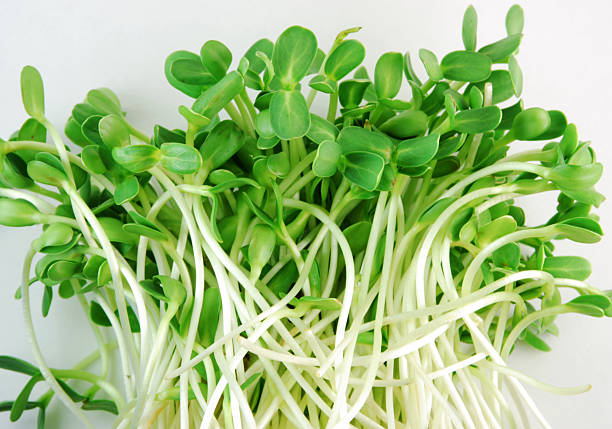7 Amazing Health Benefits of Sunflower Sprouts (And How To Make Them Yourself)
Sunflower sprouts, also known as sunflower microgreens or sunflower greens, are a delicious addition to any diet. Let's explore the amazing health benefits of sunflower sprouts and how to easily make them yourself!

This post may include affiliate links. Please refer to our disclaimer for full disclaimer.
These baby plants are packed with essential nutrients and offer a wide range of health benefits. From boosting the immune system to promoting heart health, sunflower sprouts have gained popularity among health-conscious individuals.
In this article, we will explore seven amazing health benefits of sunflower sprouts and provide you with a step-by-step guide on how to grow your own sunflower sprouts at home.
If you're interested in learning more about sprouts, make sure to purchase your own sprouting kit and read more about sprouts here.
7 Health Benefits Of Sunflower Sprouts
1. Rich Source of Vitamins
Sunflower sprouts are an excellent source of vitamins, particularly vitamin E, vitamin C, and the B complex vitamins. Vitamin E is a potent antioxidant that helps protect the body against free radical damage and supports healthy skin. Vitamin C boosts the immune system and aids in collagen production, which promotes wound healing and healthy blood vessels. The B complex vitamins play a vital role in energy production, nervous system function, and maintaining a healthy metabolism.
2. High in Essential Nutrients
Sunflower sprouts contain a wide array of essential nutrients, including essential amino acids, dietary fiber, and essential fatty acids. Essential amino acids are crucial for building proteins and supporting overall health. Dietary fiber aids in digestion and promotes healthy blood sugar levels. Essential fatty acids, such as linoleic acid, are important for brain health, reducing inflammation, and maintaining good cardiovascular health.
3. Heart Health Promotion
The nutrient content of sunflower sprouts contributes to heart health. They are low in saturated fat and cholesterol and are a good source of healthy fats, including monounsaturated fats found in sunflower oil. These healthy fats help lower bad cholesterol levels, reducing the risk of heart disease and stroke. Sunflower sprouts also contain phenolic compounds and phenolic acids, which have been shown to have protective effects against heart disease and high blood pressure.
4. Immune System Boost
Sunflower sprouts are a great way to boost your immune system. They are rich in vitamin C, which enhances immune function and aids in the production of white blood cells that fight off infections. The antioxidants in sunflower sprouts also help reduce inflammation and protect the body against chronic diseases.
5. Nutritional Support for Pregnancy
Pregnant women can benefit greatly from incorporating sunflower sprouts into their diet. Sunflower sprouts are a rich source of folate (vitamin B9), a crucial nutrient for the development of the baby's neural tube. Folate deficiency during pregnancy can lead to birth defects. Additionally, the high content of vitamins A, C, and E in sunflower sprouts supports healthy skin, vision, and immune function for both the mother and the baby.
6. Blood Pressure Regulation
Sunflower sprouts can help regulate blood pressure due to their high potassium and low sodium content. Potassium is a mineral that helps relax blood vessels, allowing for improved blood flow and lower blood pressure. Including sunflower sprouts in a balanced diet can be an effective strategy for managing hypertension and reducing the risk of heart attack and stroke.
7. Anti-Inflammatory Effects
Chronic inflammation is a risk factor for many chronic diseases. Sunflower sprouts possess anti-inflammatory properties due to their rich content of antioxidants and essential fatty acids. These compounds help reduce inflammation in the body and protect against free radical damage, promoting better overall health.

How to Make Sunflower Sprouts at Home
Making your own sunflower sprouts at home is simple and rewarding. Here's a step-by-step guide:
- Soak black oil sunflower seeds in cool water for 8 hours or overnight. Use raw sunflower seeds that are specifically labeled for sprouting.
- After soaking, drain the water and rinse the seeds thoroughly under running water.
- Place the soaked seeds in a clean towel or sprouting tray and spread them evenly.
- Cover the seeds with a damp towel or use a sprouting lid to allow air circulation while keeping them moist.
- Keep the seeds in a cool, dark place for the first 24 hours to encourage germination. Then, transfer them to an area with indirect sunlight or under a grow light.
- Rinse the seeds twice a day with cool water to keep them moist and remove any potential mold or bacteria.
- Continue the rinsing process for 7 to 10 days or until the sunflower sprouts have reached the desired length of about 2-3 inches.
- Once the sprouts are ready, gently harvest them by cutting just above the soil line with clean scissors or a knife.
- Rinse the harvested sprouts thoroughly to remove any remaining seed husks or debris.
- Store the sunflower sprouts in an airtight container lined with a paper towel to absorb excess moisture. Place the container in the refrigerator, where they will stay fresh for up to a week.
- Enjoy the sunflower sprouts as a nutritious addition to salads, sandwiches, wraps, or as a garnish for various dishes. Their nutty flavor and crisp texture make them a versatile and delicious ingredient.
9 Top Tips For Success When Growing Sunflower Sprouts
To maximize the nutrient density of sunflower sprouts grown at home, follow these tips:
- Choose high-quality seeds: Opt for organic, non-GMO black oil sunflower seeds specifically labeled for sprouting. High-quality seeds will ensure optimal nutrient content and germination rates.
- Soak the seeds adequately: Soaking sunflower seeds helps initiate the germination process and makes nutrients more bioavailable. Soak the seeds in cool water for 8 hours or overnight to activate enzymes and increase nutrient density.
- Use a suitable sprouting method: While there are various methods to grow sunflower sprouts, using a sprouting tray or jar with a sprouting lid tends to yield the best results. These methods provide adequate airflow and moisture control for healthy sprout growth.
- Rinse the sprouts regularly: Rinse the sprouts twice a day with cool water to remove any mold, bacteria, or residual seed husks. This practice helps maintain a clean and optimal growing environment for the sprouts.
- Provide indirect sunlight or grow light: Once the sprouts have started germinating, transfer them to an area with indirect sunlight or use a grow light. Direct sunlight can be too intense and may lead to wilting or damage the delicate sprouts.
- Maintain proper moisture levels: Sunflower sprouts require consistent moisture for healthy growth. Avoid over-watering, which can lead to mold growth, and ensure proper drainage in your sprouting container to prevent waterlogging.
- Harvest at the right time: Harvest the sprouts when they have reached a height of about 2-3 inches. This stage ensures optimal nutrient density and flavor. Harvesting too early or too late may result in less nutrient-dense sprouts.
- Store properly: After harvesting, rinse the sprouts thoroughly and store them in an airtight container lined with a paper towel to absorb excess moisture. Place the container in the refrigerator to maintain freshness and nutrient content for up to a week.
- Consume fresh: For maximum nutrient density, consume the sunflower sprouts as soon as possible after harvesting. Fresh sprouts retain the highest nutrient levels and flavor.
By following these guidelines, you can grow sunflower sprouts at home with optimal nutrient density. Enjoy the process of cultivating your own nutritious microgreens and reap the nutritional value of sunflower sprouts.
Conclusion
I hope you learned something and enjoyed this article on the Health Benefits of Sunflower Sprouts.
Incorporating sunflower sprouts into your diet can provide amazing health benefits. From their rich source of vitamins and essential nutrients to their contribution to heart health, immune system support, and regulation of blood pressure, sunflower sprouts are truly a powerhouse of nutrition.
Growing your own sunflower sprouts at home is a cost-effective and rewarding process that allows you to enjoy fresh, nutrient-packed greens. By following the simple steps outlined above, you can easily grow your own microgreens and add a burst of flavor and nutrition to your meals while promoting better health overall.
So why not give it a try and start enjoying the benefits of sunflower sprouts today? Try using my favorite sunflower microgreens found here and get to growing!



[…] distribution across the tray prevents overcrowding and competition for resources, ensuring each microgreen gets its fair share of space and […]